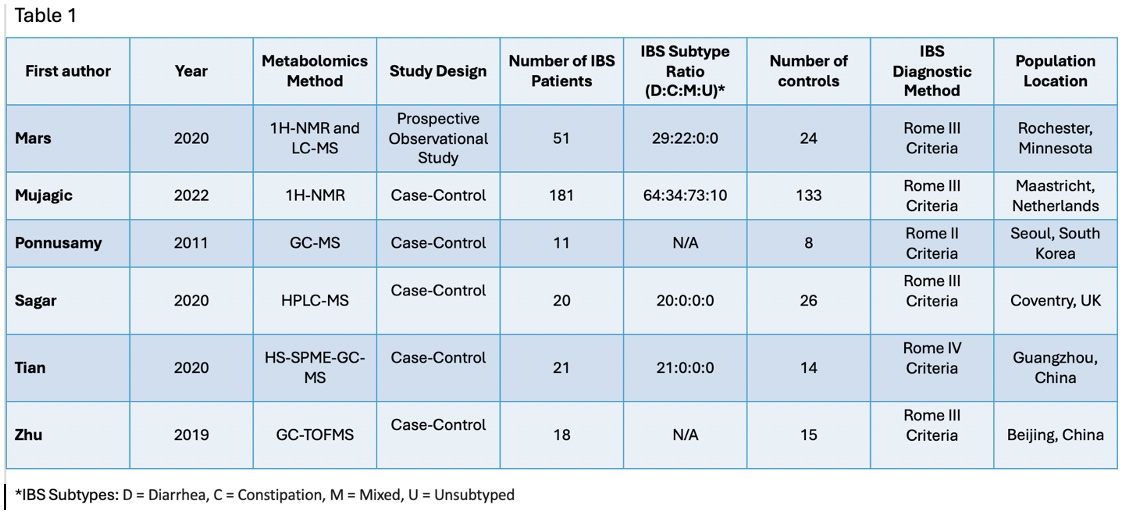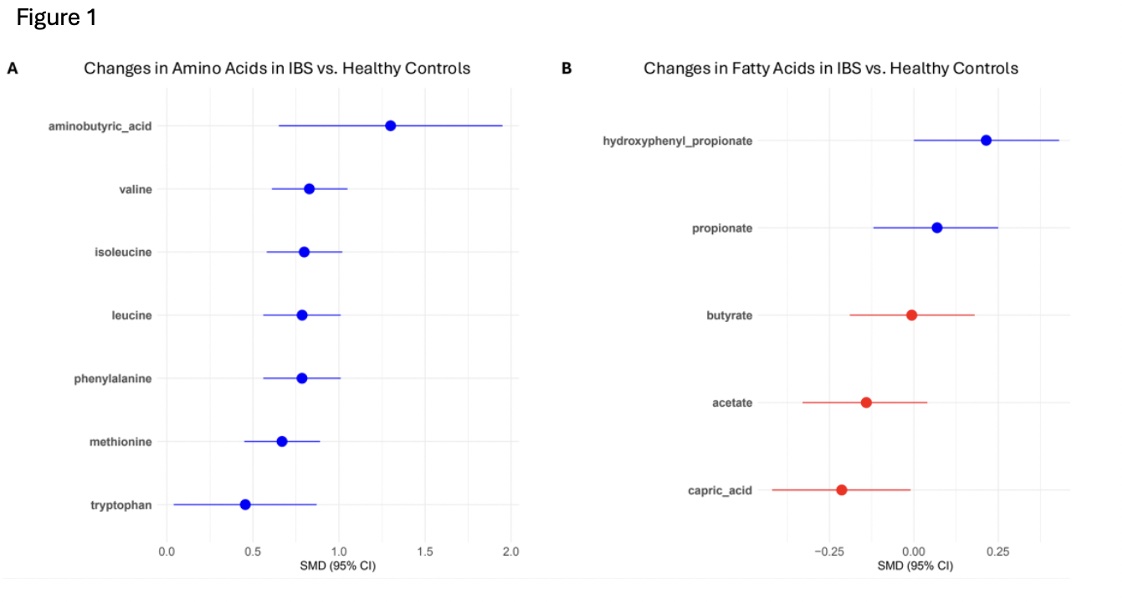Tuesday Poster Session
Category: Functional Bowel Disease
P5093 - A Microscope to the Metabolome: A Systematic Review of Metabolomics in Irritable Bowel Syndrome
Tuesday, October 28, 2025
10:30 AM - 4:00 PM PDT
Location: Exhibit Hall

Jared Fehlman, MD (he/him/his)
Huntington Hospital
Pasadena, CA
Presenting Author(s)
Award: ACG Presidential Poster Award
Jared Fehlman, MD1, Samira Mehta, MS, BS2, Carol Shannon, MA, MPH3, Shanti Eswaran, MD4, Eric D. Shah, MD, MBA5, Borko Nojkov, MD2, Shrinivas Bishu, MD3, Krishna Rao, MD, MS4, Jeffrey Berinstein, MD, MS3, Prashant Singh, MD2, William Chey, MD, FACG6, Allen Lee, MD, MS2
1Huntington Hospital, Pasadena, CA; 2University of Michigan Medical School, Ann Arbor, MI; 3University of Michigan, Ann Arbor, MI; 4Michigan Medicine, Ann Arbor, MI; 5Division of Gastroenterology and Hepatology, University of Michigan, Ann Arbor, MI; 6University of Michigan Health, Ann Arbor, MI
Introduction: Changes in the composition of microbial communities are believed to have an important role in the pathogenesis of irritable bowel syndrome (IBS). Metabolomics may provide a deeper understanding of these changes. Thus, a systematic review was performed to determine whether IBS patients have changes in their fecal metabolites compared with healthy controls.
Methods: We performed a systematic review (CRD42023495392) with searches on MEDLINE, Embase, Scopus, Web of Science Core Collection, and Cochrane CENTRAL and Reviews through April 7, 2023. Studies were eligible if they were human studies examining metabolites in adults with IBS by Rome criteria vs healthy controls. Data from each study was extracted, including number of participants, biological samples, analytic technique, as well as the mean and standard deviation for each metabolite. Metabolites present in at least two studies were then eligible for meta-analysis and results were generated from a random effects model.
Results: 3,903 articles comparing untargeted metabolomics in IBS patient’s vs healthy controls (HCs) were identified. Six studies, involving a total of 519 patients, met the eligibility criteria and were selected for data extraction (Table 1). Of the 83 metabolites analyzed in the six studies, a total of 12 metabolites were significantly different between IBS patients and HCs. Seven of these were amino acids, including aminobutyric acid, which is a key neurotransmitter regulating visceral nociception and brain-gut communication (Fig. 1a). Tryptophan, produced by the gut microbiota and regulates the enteric nervous system, was also enriched in IBS patients compared with HCs. The remaining five metabolites were fatty acids, including propionate and hydroxyphenyl propionate, which were enriched in IBS patients compared with HCs (Fig. 1b). Propionate has previously been shown to correlate with IBS symptom severity. The remaining three fatty acids, including capric acid, acetate, and butyric acid, were depleted in IBS patients compared with HCs.
Discussion: Alterations in gut microbial structure and function is believed to play a role in the pathophysiology of IBS. This current systematic review has identified 12 metabolites that were found to be significantly different between patients with IBS vs healthy controls. These metabolites may correlate with different components of IBS symptom severity and further research investigating these specific pathways should be done in the future.

Figure: Table 1. Individual Study Characteristics

Figure: Figure 1a. Changes in Amino Acids in IBS vs. Healthy Controls 1b. Changes in Fatty Acids in IBS vs Healthy Controls
Disclosures:
Jared Fehlman indicated no relevant financial relationships.
Samira Mehta indicated no relevant financial relationships.
Carol Shannon indicated no relevant financial relationships.
Shanti Eswaran indicated no relevant financial relationships.
Eric Shah: Ardelyx – Consultant. Mahana Therapeutics – Consultant. NeurAxis – Consultant. Salix Pharmaceuticals – Consultant. Takeda Pharmaceuticals – Consultant. University of Michigan – Intellectual Property/Patents.
Borko Nojkov indicated no relevant financial relationships.
Shrinivas Bishu indicated no relevant financial relationships.
Krishna Rao indicated no relevant financial relationships.
Jeffrey Berinstein indicated no relevant financial relationships.
Prashant Singh: Uptodate – Royalties.
William Chey: Ardelyx – Consultant. Atmo – Consultant. Biomerica – Consultant. Commonwealth Diagnostics International – Grant/Research Support. Coprata – Stock Options. Dieta – Stock Options. Digital Manometry – Intellectual Property/Patents. Evinature – Stock Options. FoodMarble – Stock Options. Gemelli – Consultant. Kiwi BioScience – Stock Options. Modify Health – Stock Options. My Nutrition Health – Intellectual Property/Patents. Phathom – Consultant. Rectal Expulsion Device – Intellectual Property/Patents. Redhill – Consultant. Salix – Consultant, Grant/Research Support. Takeda – Consultant. Vibrant – Consultant.
Allen Lee: Atmo Biosciences – Consultant.
Jared Fehlman, MD1, Samira Mehta, MS, BS2, Carol Shannon, MA, MPH3, Shanti Eswaran, MD4, Eric D. Shah, MD, MBA5, Borko Nojkov, MD2, Shrinivas Bishu, MD3, Krishna Rao, MD, MS4, Jeffrey Berinstein, MD, MS3, Prashant Singh, MD2, William Chey, MD, FACG6, Allen Lee, MD, MS2. P5093 - A Microscope to the Metabolome: A Systematic Review of Metabolomics in Irritable Bowel Syndrome, ACG 2025 Annual Scientific Meeting Abstracts. Phoenix, AZ: American College of Gastroenterology.
Jared Fehlman, MD1, Samira Mehta, MS, BS2, Carol Shannon, MA, MPH3, Shanti Eswaran, MD4, Eric D. Shah, MD, MBA5, Borko Nojkov, MD2, Shrinivas Bishu, MD3, Krishna Rao, MD, MS4, Jeffrey Berinstein, MD, MS3, Prashant Singh, MD2, William Chey, MD, FACG6, Allen Lee, MD, MS2
1Huntington Hospital, Pasadena, CA; 2University of Michigan Medical School, Ann Arbor, MI; 3University of Michigan, Ann Arbor, MI; 4Michigan Medicine, Ann Arbor, MI; 5Division of Gastroenterology and Hepatology, University of Michigan, Ann Arbor, MI; 6University of Michigan Health, Ann Arbor, MI
Introduction: Changes in the composition of microbial communities are believed to have an important role in the pathogenesis of irritable bowel syndrome (IBS). Metabolomics may provide a deeper understanding of these changes. Thus, a systematic review was performed to determine whether IBS patients have changes in their fecal metabolites compared with healthy controls.
Methods: We performed a systematic review (CRD42023495392) with searches on MEDLINE, Embase, Scopus, Web of Science Core Collection, and Cochrane CENTRAL and Reviews through April 7, 2023. Studies were eligible if they were human studies examining metabolites in adults with IBS by Rome criteria vs healthy controls. Data from each study was extracted, including number of participants, biological samples, analytic technique, as well as the mean and standard deviation for each metabolite. Metabolites present in at least two studies were then eligible for meta-analysis and results were generated from a random effects model.
Results: 3,903 articles comparing untargeted metabolomics in IBS patient’s vs healthy controls (HCs) were identified. Six studies, involving a total of 519 patients, met the eligibility criteria and were selected for data extraction (Table 1). Of the 83 metabolites analyzed in the six studies, a total of 12 metabolites were significantly different between IBS patients and HCs. Seven of these were amino acids, including aminobutyric acid, which is a key neurotransmitter regulating visceral nociception and brain-gut communication (Fig. 1a). Tryptophan, produced by the gut microbiota and regulates the enteric nervous system, was also enriched in IBS patients compared with HCs. The remaining five metabolites were fatty acids, including propionate and hydroxyphenyl propionate, which were enriched in IBS patients compared with HCs (Fig. 1b). Propionate has previously been shown to correlate with IBS symptom severity. The remaining three fatty acids, including capric acid, acetate, and butyric acid, were depleted in IBS patients compared with HCs.
Discussion: Alterations in gut microbial structure and function is believed to play a role in the pathophysiology of IBS. This current systematic review has identified 12 metabolites that were found to be significantly different between patients with IBS vs healthy controls. These metabolites may correlate with different components of IBS symptom severity and further research investigating these specific pathways should be done in the future.

Figure: Table 1. Individual Study Characteristics

Figure: Figure 1a. Changes in Amino Acids in IBS vs. Healthy Controls 1b. Changes in Fatty Acids in IBS vs Healthy Controls
Disclosures:
Jared Fehlman indicated no relevant financial relationships.
Samira Mehta indicated no relevant financial relationships.
Carol Shannon indicated no relevant financial relationships.
Shanti Eswaran indicated no relevant financial relationships.
Eric Shah: Ardelyx – Consultant. Mahana Therapeutics – Consultant. NeurAxis – Consultant. Salix Pharmaceuticals – Consultant. Takeda Pharmaceuticals – Consultant. University of Michigan – Intellectual Property/Patents.
Borko Nojkov indicated no relevant financial relationships.
Shrinivas Bishu indicated no relevant financial relationships.
Krishna Rao indicated no relevant financial relationships.
Jeffrey Berinstein indicated no relevant financial relationships.
Prashant Singh: Uptodate – Royalties.
William Chey: Ardelyx – Consultant. Atmo – Consultant. Biomerica – Consultant. Commonwealth Diagnostics International – Grant/Research Support. Coprata – Stock Options. Dieta – Stock Options. Digital Manometry – Intellectual Property/Patents. Evinature – Stock Options. FoodMarble – Stock Options. Gemelli – Consultant. Kiwi BioScience – Stock Options. Modify Health – Stock Options. My Nutrition Health – Intellectual Property/Patents. Phathom – Consultant. Rectal Expulsion Device – Intellectual Property/Patents. Redhill – Consultant. Salix – Consultant, Grant/Research Support. Takeda – Consultant. Vibrant – Consultant.
Allen Lee: Atmo Biosciences – Consultant.
Jared Fehlman, MD1, Samira Mehta, MS, BS2, Carol Shannon, MA, MPH3, Shanti Eswaran, MD4, Eric D. Shah, MD, MBA5, Borko Nojkov, MD2, Shrinivas Bishu, MD3, Krishna Rao, MD, MS4, Jeffrey Berinstein, MD, MS3, Prashant Singh, MD2, William Chey, MD, FACG6, Allen Lee, MD, MS2. P5093 - A Microscope to the Metabolome: A Systematic Review of Metabolomics in Irritable Bowel Syndrome, ACG 2025 Annual Scientific Meeting Abstracts. Phoenix, AZ: American College of Gastroenterology.

